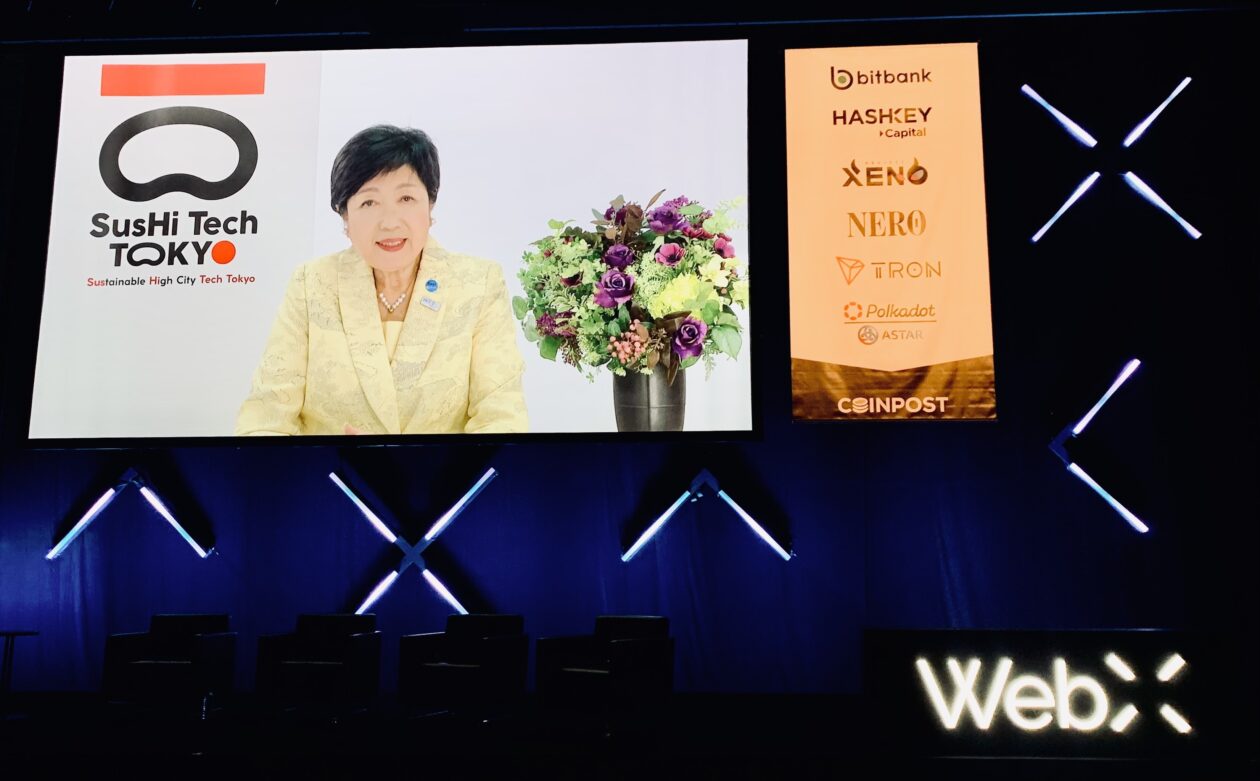As the two-day WebX Asia conference drew to a close at the Tokyo International Forum in Japan’s capital, the city’s governor Yuriko Koike beamed in by video to congratulate the organizers and make the point that Tokyo is positioning itself to become a global crypto hub and center of digital innovation.
Prime Minister Fumio Kishida also appeared at the conference via video address on the opening day, and Koike reiterated the message that Japan, and Tokyo in particular, is now open for Web3 business and investment.
“Tokyo is working on the digitization of finance through decentralized technology in order to evolve into a world-leading international financial city,” said Koike, the first woman to win the Tokyo governor’s seat, which she has held since 2016.
She pointed to the Tokyo Innovation Base, a cross-industry platform connecting government agencies, businesses and academics with promising digital startups as an example of the city government’s efforts to date. She also highlighted the recently announced Sushi Tech Tokyo 2024 startup event to be held in the city in the spring as a way for the capital to build on the momentum of this week’s Web X Asia conference.
The Sushi Tech event, which will run from April 27 to May 26, is expected to attract some 500,000 visitors to the Japanese capital and will tap the 28.6 billion yen (US$185 million) fund allocated by the Tokyo Metropolitan Government in 2023 to bolster the city’s startup scene.
Koike emphasized the role of Web3 — a new phase of the internet built around decentralized blockchain technologies, the metaverse, and non-fungible tokens (NFTs) — to foster startups and develop a new generation of Japanese technology companies capable of competing on the world stage.
“Decentralized technologies such as Web3 and the blockchain are set to bring about a major transformation in the global social economy,” Koike said.
The WebX Asia event organizers said that the event had attracted over 10,000 attendees, 300 speakers and 130 individual sponsors. It had, they said, also attracted media coverage from 50 different outlets and — most significantly for the nation’s Web3 industry — the interest of domestic mainstream media, including national broadcaster NHK.
While the event attracted a broad range of coverage and interest — certain taxis in the capital ran ads on their in-car tv screens promoting the event — attendances for the conference on the second day were significantly lower than the opening day, giving a hollowed-out feeling to the main exhibition space and some of the presentations.
That sense of tapering enthusiasm spoke to the challenges that Japan’s Web3 industry faces in returning to its previous status as an early adopter of blockchain technology and digital assets.
On a panel titled “ How to Build Successfully in Japan,” Emi Yoshikawa, vice president of strategy and operations at payment protocol Ripple, referred to those challenges, saying that she felt more work was needed for Japan’s digital asset firms to cement their place in the global industry.
“We have a lot to offer,” she said. However, she added, “ I feel Japan definitely [needs to do] more work to appeal to outside countries.”
Part of that problem, Yoshikawa said, was continuing difficulties in communicating the nation’s internal Web3 developments. In that regard, this year’s spate of digital asset conferences throughout the country has, she said, helped raise the profile of Japan’s Web3 industry.
“I’m so glad that this year we have these international conferences,” she said. “But I think we definitely need more work and more effort to communicate what Japan can offer.”






